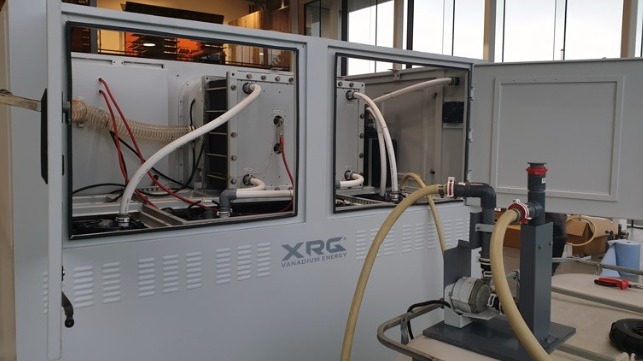Could Flow Battery Technology Help Shipping Decarbonize?

Canadian mining company VanadiumCorp announced this week that it has reached an agreement with a Dutch naval architect and a German shipowner on the development and testing of a novel energy storage system for shipboard use.
VanadiumCorp is the developer of a massive, high grade vanadium ore prospect at Lac Doré, Quebec. The element's largest industrial use is in the production of vanadium alloy steels, commonly used for tool steel and other high-strength applications. But VanadiumCorp has another idea in mind: it sees the Lac Doré deposit as a supply source for industrial-scale deployment of the vanadium redox flow battery (VRFB) - a liquid electrolyte energy storage system with few existing commercial installations.
The VRFB was developed in the 1980s, and it entails two tanks of the same vanadium electrolyte solution in different oxidation states - one higher, one lower. Pumps circulate both fluids past a membrane that allows protons to pass between the two sides, facilitating electrical charging or discharging of the cell. The energy storage capacity is limited only by the size of the tanks.
While it has significant advantages in some stationary applications - particularly grid storage and backup power - the VRFB's energy density and full-cycle efficiency are lower than found in lithium-ion batteries, and it has not historically been considered suitable for mobile uses. In addition, while fully contained within the cell, the inorganic vanadium compounds commonly used in a VRFB are considered toxic by OSHA.
VanadiumCorp believes it has a solution to the VRFB's energy density shortcomings, and this would be key for the maritime sector. Commonplace lithium-ion batteries are suitable for short ferry runs, but their energy density is far too low for long-distance routes; the energy density of existing VRFBs is even lower. The fix, VanadiumCorp believes, is a new vanadium / bromine chemistry, which the firm says has a much higher energy density than existing vanadium / sulphuric acid VRFBs.
In December, the firm announced that the German-Australian Alliance for Electrochemical Technologies for Storage of Renewable Energy (CENELEST) has completed testing on this new electrolyte chemistry, and it said that the results are promising. "A higher energy density V-Br electrolyte and advancements in stack architecture could represent two to three times the energy stored and made available by a conventional VRFB. The implications for global sustainability and various industries transitioning to zero emissions is a potential game-changer," the company said last month.
As part of a new partnership, VanadiumCorp's EU research branch is now working on designing and sourcing parts for test-scale battery cells. The work will support a joint venture with naval architecture company Conoship International Projects oif the Netherlands and shipowner Vega Reederei and Partners GmbH of Hamburg: together, they want to develop next-generation VRFB batteries for the zero-carbon shipping market. Conoship will contribute marine engineering designs to integrate the battery into vessel propulsion systems, while Vega will arrange project financing, contribute fleet operations expertise and conduct field testing of the battery prototype.
"Greenhouse gas reduction is exceptionally challenging for the shipping industry. The industry's 2050 climate goal of halving greenhouse gas emissions from 2008 levels can only be achieved with the accelerated construction of Zero-Emission Ships and novel solutions," said Adriaan Bakker, CEO of VanadiumCorp, in a statement Wednesday.
